C. Gene Wilkes's Blog, page 12
February 14, 2012
Four Reasons to Withdraw and Pray
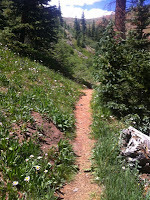 Jesus modeled for us how to live an abundant life with God and others. Everything he did and said becomes a template for our lives if we desire to follow him. You and I can learn this abundant life even in short passages recorded in the Gospels.
Jesus modeled for us how to live an abundant life with God and others. Everything he did and said becomes a template for our lives if we desire to follow him. You and I can learn this abundant life even in short passages recorded in the Gospels.Luke, who tells us more about Jesus' prayer life than any other Gospel writer, noted that...
...Jesus often withdrew to lonely places and prayed. (Luke 5:16; TNIV)
If Jesus withdrew from crowds and ministry regularly, surely there are advantages for us to follow his lead.
Here are four reasons to withdraw in order to pray
Solitude. The busyness and noise of our lives keep us from hearing the voice of God. God speaks to us every day, but we miss it because we fill our lives with busyness* and noise in an effort to fill the voids that only God can fill. Richard Foster's group, Renovare, reminds us, Solitude is "An open relational space for being found by God and freed from competing loyalties." When was the last time you created space to be found by God and to hear His voice?Survival. You cannot survive spiritually (or otherwise) without time away from the fray. @johnortberg tweeted last week a saying of Vance Havner, "if u don't come apart for a while, u'll come apart after a while." You can't run your car without stopping for gas. Why do you think you can do that with your soul? Spiritual protection. We are in a spiritual battle for hearts and minds. We have an enemy who is hellbent on our destruction. Withdrawing to "suit up" (Eph. 6:10-17) is essential to know the enemy and discover how to combat his "schemes." When was the last time to retreated to get supplies and observe the strategies of the Evil One?Stay on mission with the One who sent you. Imagine a military unit sent to accomplish a mission and never radioing into their CO as to where they were, what they encountered, or the need for additional support and troops! Why do we think we can be the sent ones without ever checking in with the one who sent us?!? When did you last withdraw to see if you were really doing what God sent you here to do as the church, at home, and in the world?*It's always interested me that there is only one letter difference between busyness and business. Wisdom is knowing when you are in one or the other.
If you would like to hear my message on this habit of Jesus, you can hear it here. Join us at Legacy Church as we learn to pray like Jesus.
Published on February 14, 2012 07:46
February 7, 2012
Eat This Book
The prophet Ezekiel recorded these words from God: "Son of man, eat this scroll I am giving you and fill your stomach with it." So I ate it, and it tasted as sweet as honey in my mouth." (Ezekiel. 3:3)
At the end of the Church canon in the Revelation, the voice in heaven called to John, and said, "Take [the little scroll] and eat it. It will turn your stomach sour, but 'in your mouth it will be as sweet as honey.' " (Rev. 10:9)
It Is odd to me that eating the words instructed by God taste sweet to both servants of God but when John had digested his scroll it turned his stomach sour.
The difference?
I'm not sure but it may be that Ezekiel's scroll contained a word of encouragement from God and John was about to measure the people and find them wanting in the things of God.
The word of God is that way sometimes. It always tastes good going down but when you begin to digest it you find yourself with spiritual nausea because the word has begun to eat at the core of your being.
We have begun to read The Gospel of Luke as a church. Join us at www.legacychurch.org for daily readings via email and to join a small group to be there for you when you get a sour stomach.
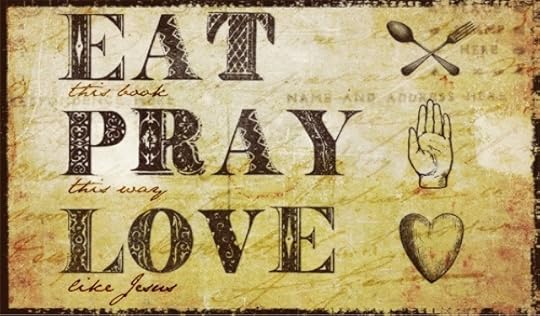

At the end of the Church canon in the Revelation, the voice in heaven called to John, and said, "Take [the little scroll] and eat it. It will turn your stomach sour, but 'in your mouth it will be as sweet as honey.' " (Rev. 10:9)
It Is odd to me that eating the words instructed by God taste sweet to both servants of God but when John had digested his scroll it turned his stomach sour.
The difference?
I'm not sure but it may be that Ezekiel's scroll contained a word of encouragement from God and John was about to measure the people and find them wanting in the things of God.
The word of God is that way sometimes. It always tastes good going down but when you begin to digest it you find yourself with spiritual nausea because the word has begun to eat at the core of your being.
We have begun to read The Gospel of Luke as a church. Join us at www.legacychurch.org for daily readings via email and to join a small group to be there for you when you get a sour stomach.

Published on February 07, 2012 05:33
January 31, 2012
Homeless in Suburbia
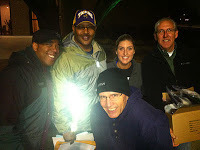 Markus, Gabriel, Sarah, Russell and meLast Thursday night, January 27, at the invitation of Russell Head, I joined 100+ volunteers with the Collin County Homeless Coalition to make an annual count of the homeless in our county.
Markus, Gabriel, Sarah, Russell and meLast Thursday night, January 27, at the invitation of Russell Head, I joined 100+ volunteers with the Collin County Homeless Coalition to make an annual count of the homeless in our county. We gathered at City Hall about 8:00 p.m., and after an hour plus of training and assignments our team headed out with a Plano Police officer to look for those who are categorized as homeless in our city. We carried our survey forms and "care packages" supplied by local Scout troops, non-profits, and churches.
It had rained very hard two days previously, and the places where the officer knew people stayed--along railroad tracks, under freeway overpasses, and along the "creeks" that run through town--were empty. We also did not find anyone in the cars parked in store and office parking lots between 11:00 p.m. and 1:00 a.m. that night.
Part of our team did talk to a hotel employee who "knew what we were asking" but did not want to give out any information about who he knew stayed there because they had to. We also stopped by the hospital in our assigned area, and the police officer on duty there said the homeless regularly came to sit in the ER or hospital chapel to get out of the cold, but no one was there that evening.
While we did not talk to anyone--see the reports below of those who did--I got a new perspective of the need in our City, called the The Pretty Much Perfect City. We walked places I drive by every week, and never see those who stay there as their "home."
Suburbia has homeless, and we who are the called-out-ones need to not only be aware of the homeless but work to serve them and partner with those who do.
The ways we do this as Legacy Church is our support of the Plano Food Pantry and Minnie's Food Pantry. We also partner with Dallas Providence Homes to provide transformational housing for abused women and their children. This is not enough, but it is something, and I am pleased we have joined others to address the needs of those who have no place to live.
Here is the report from the Plano Police Department from the evening.
Here is a news report the following day from a local CBS affiliate.
The Face of Homelessness in Collin County.
What will you do today to help?
Published on January 31, 2012 08:29
January 24, 2012
Luke's Look at Jesus
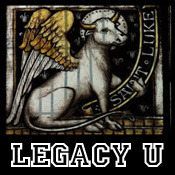 The Ox of Luke's GospelAs part of Legacy U at Legacy Church this month, I am teaching what we call "Luke's Look at Jesus." (The other sessions are taught by members of our pastoral staff. Check them out, too.)
The Ox of Luke's GospelAs part of Legacy U at Legacy Church this month, I am teaching what we call "Luke's Look at Jesus." (The other sessions are taught by members of our pastoral staff. Check them out, too.)Without going into a lot of detail, I have observed with others that Luke had a huge heart for those to whom society and the religious folk of Jesus' day gave little value and recorded more of Jesus' interaction with them than any of the other three evangelistic biographers of Jesus.
Here are three groups that are the most obvious:
Outcasts. Jesus intentionally went to the outcasts--those whom religious and clean people refused to touch. Jesus not only touched them, but healed them, giving them new status among those who thought they alone had God's favor. (Luke 17:11-19)
Women. Jesus not only taught women, he entered their homes, (Luke 10:38-42) healed them, and was perfectly comfortable having them travel with him. (Luke 8:1-3) One of the few times we are told Jesus' "heart went out" to someone was when he saw the weeping widow leaving town to bury her only son. (Luke 7:11-17) His birth stories about John the Baptist and Jesus revolve around Elizabeth and Mary, rather than their husbands. Luke recognized Jesus' attention to those who held little status in the religious world Jesus came to restore.
Outsiders. Jesus was not easily amazed. One of the two times Luke observed him startled was when a Centurion acknowledged his authority and his use of it. Jesus declared he had not seen "such great faith even in Israel" like that of this outsider. (Luke 7:1-10) Jesus' most famous story was that of the Good Samaritan, and Luke is the only Gospel author to record it. (Luke 10:25-37)
Luke's look at Jesus highlights Jesus' ministry to the outcasts, women, and outsiders of that day more than any of the other Evangelists.
I wonder if we who call ourselves disciples or followers of Jesus find ourselves serving those whom our society and religious community consider outcasts and outsiders?
What would our churches and cities look like if we took our apprenticeship to Jesus seriously and actually followed him where he went?
Just wondering.
Published on January 24, 2012 07:19
January 17, 2012
Martin Luther King, Jr. Pastor-Preacher
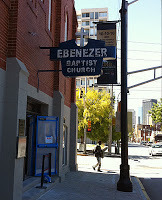 One of my beefs with the coverage of Martin Luther King, Jr. Day was that no one, I mean no one, that I heard or watched ever mentioned he was a pastor of a local church long before he led a national movement for civil rights.
One of my beefs with the coverage of Martin Luther King, Jr. Day was that no one, I mean no one, that I heard or watched ever mentioned he was a pastor of a local church long before he led a national movement for civil rights.Why is that important? He was a preacher, not a public speaker. He was a pastor, not a community organizer. He preached Sunday after Sunday from the Bible that dealt with real issues in his congregation's life, and from addressing those needs in a biblical-theological way, the message from the local church touched the community, state, nation and then the world.
Mervyn A. Warren in his book King Came Preaching wrote that King believed God and his people, not governments and community organizations would change the world.
"In the sermons of King, then, God is the sustaining power in the universe whose presence assures the ultimate triumph of good over evil. As the One who provides human beings with inner resources to meet life's problems effectively, God works not separately but in cooperation with human faith to cast out all forms of evil from human being's environment." (Warren, 126)
My point is not to take away from King's leadership of the SCLC or his Nobel Peace Prize, but to remind us all that a pastor and a local congregation can change the world.
I know in our PC world that mentioning even a pastor's faith is out of place, but to call people to fulfill King's Dream without calling them to King's core faith in God is asking them to do something he never intended nor believed they could do without God.
Yes, in his later years the movement seemed to be more about issues than faith, but even his last message to the sanitation workers in Memphis, "I've been to the mountain top," on the eve of his assassination was a sermon packed with biblical illusions, a parable of Jesus, and his own faith in God. He even identifies himself as a pastor, not a movement leader.
Media, Society, please do not overlook the real power of Martin Luther King, Jr.
Church, do not forget the power of the Gospel and the power of the followers of Jesus to overcome the evil in our world.
"Hate evil," Paul wrote. (Romans 12:14) Let me add, "Be the people of God." Change the world for good, but do it in the power of the Gospel and as the church.
Some links you may like:
Billy Graham and Martin Luther King, Jr. worked together in a crusade in New York.
Digital archive of 20,000 MLK letters, speeches, sermons, and gifts.
Published on January 17, 2012 07:45
January 10, 2012
Ashamed of Tim?
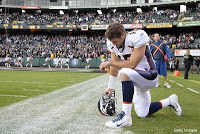 I have to jump into the Tim Tebow debate of whether or not the NFL is the place for the Denver QB's PDA (public display of adoration). You can find opinions that believe faith should stay in the church (from the Jerusalem Post) to those who think he's doing is what we all should be doing. Whatever your opinion, USA TODAY sums it up, "Denver QB inspires nation." (Check out the search hits and Twitter post numbers. Astonishing!)
I have to jump into the Tim Tebow debate of whether or not the NFL is the place for the Denver QB's PDA (public display of adoration). You can find opinions that believe faith should stay in the church (from the Jerusalem Post) to those who think he's doing is what we all should be doing. Whatever your opinion, USA TODAY sums it up, "Denver QB inspires nation." (Check out the search hits and Twitter post numbers. Astonishing!)I'm on the Tebow bandwagon. Part of the greatness of his witness is that it is who he is! He's Tim Tebow, an over-the-top, extravert football player who inspires teammates and is a Christ-follower. He's not trying to be someone else or build a platform for his witness. He's who he is, where he is, displaying his love for the Lord. He'll be Tim Tebow the Christian if he has a career-ending injury this Sunday against the Patriots.
I respect him and wish I had a little more of his expressive flair in my witness.
Last week we began a series as Legacy Church called, "A Dying for Christ Life." The phrase describes what we call a maturing, growing follower of Jesus. If you follow the Way to spiritual growth as described in Scripture, we believe you could come to the place you are willing to trust Jesus to the point of giving up your life for him.
We took our description from Jesus' clear but neglected teaching about what it takes to be a Christ-follower:
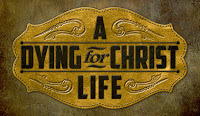 Then he said to them all: "Whoever wants to be my disciple must deny themselves and take up their cross daily and follow me." Luke 9:23
Then he said to them all: "Whoever wants to be my disciple must deny themselves and take up their cross daily and follow me." Luke 9:23 If those first three steps on the way of discipleship are not enough to unsettle your heart, Jesus concluded his teaching with these words:
If any of you are ashamed of me and my words, the Son of Man will be ashamed of you when he comes in his glory and in the glory of the Father and of the holy angels. Luke 9:26
I have to admit that if Jesus showed up today, I'm sure he would not be ashamed of Tim Tebow. My fear is that Jesus would be ashamed of my lack of PDA (public display of adoration). Have I risked criticism with my PDA?
One of my favorite tweets on the subject read:
Christ is more embarrassed by Christians who are embarrassed by Tim Tebow, than anything Tebow will ever do. Carlos Whittaker
Go Broncos! Go Tim Tebow! Let the PDA increase!
If you want to hear the foundational message about what Dying-for-Christ life may look like, you can hear it here.
Published on January 10, 2012 06:54
January 6, 2012
Steve Jobs of Small Groups?
There is a (very long) blog in the Dallas Morning News that asked several theologians if we need a "Steve Jobs of Religion". This question is based upon a
NYT article titled "Americans Undecided about God?" by Eric Weiner
who is a self proclaimed "None" (people who chose None under Religious affiliations when surveyed). Weiner writes:
"We need a Steve Jobs of religion. Someone (or ones) who can invent not a new religion but, rather, a new way of being religious. Like Mr. Jobs's creations, this new way would be straightforward and unencumbered and absolutely intuitive. Most important, it would be highly interactive. I imagine a religious space that celebrates doubt, encourages experimentation and allows one to utter the word God without embarrassment. A religious operating system for the Nones among us. And for all of us."
Cynthia Rigby, W. C. Brown Professor of Theology, Austin Presbyterian Theological Seminary, suggests today's Christianity is more interactive and intuitive than the Nones realize. The Steve Jobs of religion would be the ones providing insight to the interactive and intuitive nature of our God.
And that is where I think the Life Group Coaches and leaders come into play. We don't need to be Steve Jobs the inventor, but maybe Steve Jobs the lover of his inventions. If you've seen videos of him talking about Apple products, his eyes are alive and he can't wait to tell you about all the features of the product, how it will change your life and how it changed his life. As soon as his video is over, you want to go out and buy it at that very moment.
If we as Leaders can relate our enthusiasm, our love of Christ to our teams in the same manner - how powerful it becomes. We reach out to our teams (and the Nones in our world) to show them the intuitive and interactive nature of our God and our church. And we are there to walk through life with them. My hope and desire is that they will respond and want to invite Christ into their hearts - right at that very moment.
Post by guest blogger, Victor Galvan, one of Legacy's LifeGroup coaches.
"We need a Steve Jobs of religion. Someone (or ones) who can invent not a new religion but, rather, a new way of being religious. Like Mr. Jobs's creations, this new way would be straightforward and unencumbered and absolutely intuitive. Most important, it would be highly interactive. I imagine a religious space that celebrates doubt, encourages experimentation and allows one to utter the word God without embarrassment. A religious operating system for the Nones among us. And for all of us."
Cynthia Rigby, W. C. Brown Professor of Theology, Austin Presbyterian Theological Seminary, suggests today's Christianity is more interactive and intuitive than the Nones realize. The Steve Jobs of religion would be the ones providing insight to the interactive and intuitive nature of our God.
And that is where I think the Life Group Coaches and leaders come into play. We don't need to be Steve Jobs the inventor, but maybe Steve Jobs the lover of his inventions. If you've seen videos of him talking about Apple products, his eyes are alive and he can't wait to tell you about all the features of the product, how it will change your life and how it changed his life. As soon as his video is over, you want to go out and buy it at that very moment.
If we as Leaders can relate our enthusiasm, our love of Christ to our teams in the same manner - how powerful it becomes. We reach out to our teams (and the Nones in our world) to show them the intuitive and interactive nature of our God and our church. And we are there to walk through life with them. My hope and desire is that they will respond and want to invite Christ into their hearts - right at that very moment.
Post by guest blogger, Victor Galvan, one of Legacy's LifeGroup coaches.
Published on January 06, 2012 09:30
January 2, 2012
Baptism in a Barrowed Spa
Baptism is the ancient, Christ-modeled act of associating with the person and movement of Jesus, who is the Christ. For centuries follower-apprentices of Jesus have been baptized before friends and family to witness their allegiance to Jesus as their Rescuer and Leader. From the Ethiopian eunuch to the Philippian jailer, God's people have baptized those who trusted Jesus wherever there was water and witnesses.
Over time, that practice was brought inside buildings with baptismal fonts and pools built into the architecture and leadership limited to credentialed, professional clergy. We know, however, that in oppressed countries Christ followers have found bathtubs, streams, and drinking troughs for animals suitable for the rite. I still witness this act in streams, homes, and lakes around the world today. But, here we usually stick to the indoor, ordained clergy rendition of the act.
I love Legacy Church because several years ago we released followers of Jesus to baptize their friends and family. As we moved to being a church of LifeGroups, we sanctioned baptized, faithful followers of Jesus and any body of water that fits the biblical image of baptism and church family and friends who would hold the person accountable to his or her faith as adequate for the rite of confession and inclusion in the the living body of Christ, the church. That has led to some wonderful stories of friendship and discipleship.
On Christmas Eve Eve this past year, we baptized some long-time friends in our LifeGroup. They had both trusted Christ previously but wanted to be part of Legacy and affirm their trust in Christ together. They also wanted relatives who are missionaries in South Africa to join in their public confession of trust. (Thus the timing of the event.)
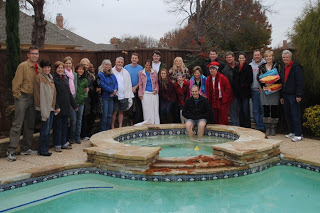 The adventure of this story is that the morning of the event, the spa of the LifeGroup member who had said they would host the baptism would not start! In the end, we walked across the street to a neighbor, who was not home but on vacation and who does not attend a church, and used their spa to witness our friend's baptism. (I can't wait to meet them and invite them to our LifeGroup when it meets at our friend's house!)
The adventure of this story is that the morning of the event, the spa of the LifeGroup member who had said they would host the baptism would not start! In the end, we walked across the street to a neighbor, who was not home but on vacation and who does not attend a church, and used their spa to witness our friend's baptism. (I can't wait to meet them and invite them to our LifeGroup when it meets at our friend's house!)
A living parable of the universal Church in suburbia USA? It is the church (Christ-followers) in the neighborhood celebrating baptism in the borrowed spa of a neighbor.
Yes, we still baptize in our building. The celebration is usually on fifth Sundays as part of our intergenerational worship times. Would you like to be part of the next one? Let us know if you want to be included. We could even find a spa if we needed to.
You can see more pictures here, and you can hear the complete song here: Arms Open Wide.
Over time, that practice was brought inside buildings with baptismal fonts and pools built into the architecture and leadership limited to credentialed, professional clergy. We know, however, that in oppressed countries Christ followers have found bathtubs, streams, and drinking troughs for animals suitable for the rite. I still witness this act in streams, homes, and lakes around the world today. But, here we usually stick to the indoor, ordained clergy rendition of the act.
I love Legacy Church because several years ago we released followers of Jesus to baptize their friends and family. As we moved to being a church of LifeGroups, we sanctioned baptized, faithful followers of Jesus and any body of water that fits the biblical image of baptism and church family and friends who would hold the person accountable to his or her faith as adequate for the rite of confession and inclusion in the the living body of Christ, the church. That has led to some wonderful stories of friendship and discipleship.
On Christmas Eve Eve this past year, we baptized some long-time friends in our LifeGroup. They had both trusted Christ previously but wanted to be part of Legacy and affirm their trust in Christ together. They also wanted relatives who are missionaries in South Africa to join in their public confession of trust. (Thus the timing of the event.)
 The adventure of this story is that the morning of the event, the spa of the LifeGroup member who had said they would host the baptism would not start! In the end, we walked across the street to a neighbor, who was not home but on vacation and who does not attend a church, and used their spa to witness our friend's baptism. (I can't wait to meet them and invite them to our LifeGroup when it meets at our friend's house!)
The adventure of this story is that the morning of the event, the spa of the LifeGroup member who had said they would host the baptism would not start! In the end, we walked across the street to a neighbor, who was not home but on vacation and who does not attend a church, and used their spa to witness our friend's baptism. (I can't wait to meet them and invite them to our LifeGroup when it meets at our friend's house!)A living parable of the universal Church in suburbia USA? It is the church (Christ-followers) in the neighborhood celebrating baptism in the borrowed spa of a neighbor.
Yes, we still baptize in our building. The celebration is usually on fifth Sundays as part of our intergenerational worship times. Would you like to be part of the next one? Let us know if you want to be included. We could even find a spa if we needed to.
You can see more pictures here, and you can hear the complete song here: Arms Open Wide.
Published on January 02, 2012 12:47
December 23, 2011
Walk or Run? Physical and Spiritual Lessons
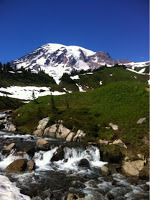 I had dinner a couple of months ago with some friends to compare notes on our Mt Rainier climbs. In the middle of our conversation the most experienced climber said, "I just like to walk." I'm not sure why, but that remark sank deep into my psyche.
I had dinner a couple of months ago with some friends to compare notes on our Mt Rainier climbs. In the middle of our conversation the most experienced climber said, "I just like to walk." I'm not sure why, but that remark sank deep into my psyche. On the way home I thought, "I like to walk too" so why do I only walk/hike/run when I go somewhere? Why do I change into special clothes to do what I like to do? I walk when I am in China, Lao, Vietnam, and when I travel. What's different at home? Walking was what I thought I'd do when I could no longer run.
I left that dinner committed to walk when I could. That was in October. Since then I have made the 7-mile round trip to my office half a dozen times, the 2-mile round trip to one of my weekly small groups 3 times, and several shorter walks from the office and home to meetings at nearby Starbucks. I'm learning to walk again, which is a challenge at times in a culture that demands speed and a suburb that was built for cars.
The results?
Physically, I have actually found I am stronger on my runs, and I am as healthy as before. Walking at least once a week stretches my legs with little impact. The treks burn calories and build muscle, and when added to my Younger-Next-Year routine, I found I have not lost a thing physically.
Spiritually, I have learned again the art of slowing down. In my weekly run to Sunday I have found my walks give me time to pray, listen to other teachers, or to Pandora worship tunes. That's time I did not have/take advantage of before. When I walk to the office, I have two hours a day of prayer and meditation. I come to the office and home calmer and have thought through my day and issues facing the church.
Yes, there are the challenges of scheduling, weather, and unexpected needs for transportation, but the whole world deals with those issues every day to get where they need to be.
I have new insight into the promise of God to those who take time for the Lord to be of help, "They will fly on wings of eagles, run and not grow weary, walk and not faint." (Isa. 40:31)
Sometimes walking is best for your heart both physically and spiritually.
Where can you walk today?
Published on December 23, 2011 08:35
December 20, 2011
Jesus and Hanukkah
 Hanukkah MenorahJesus was a Jew, and he most likely observed Hanukkah. Shocked? From what we know about Jesus' parents from the stories about his birth and infancy, they were pious, practicing members of Israel. And, as their earthly son,
Jesus was raised a pious Son of Israel
.
Hanukkah MenorahJesus was a Jew, and he most likely observed Hanukkah. Shocked? From what we know about Jesus' parents from the stories about his birth and infancy, they were pious, practicing members of Israel. And, as their earthly son,
Jesus was raised a pious Son of Israel
.Here are some examples. Eight days into his life his parents had him circumcised and named according to the Jewish Law. (Luke 2:21; Leviticus 12:3) Forty days after his birth, his mother and Joseph traveled to Jerusalem to complete God's instructions for purification and presentation of a male son to God. (Luke 2:22-24; Leviticus 12) Luke also tells us that the family made the annual trip to Jerusalem for the Festival of Passover. (Luke 2:41; Exodus 12; which we know mostly by the Seder.)
What was unique about Jesus' early life were the people's unsolicited confession as to who he was. (Read Luke 2:22-52 to read some of those.) In the middle of his parent's faithful observance of God's Law God revealed who this special child was and was to become.
So, what about Hanukkah? We are not told in the New Testament that Jesus or his family actually practiced Hanukkah, but the festival was in place in his day and given his family's loyalty to the traditions of Israel, we can suppose Jesus practiced the observance in its first-century form. The Gospel of John noted that Jesus was in Jerusalem in winter at the time of Hanukkah, known as the Festival of Dedication. (John 10:22, 23)
What's my point? My point is that Jesus learned from his parents to observe the laws and traditions God gave Israel, and every indication is that he observed them into his adult life. What is different now is that Jesus did for the festivals what he did for the other traditions and laws: He fulfilled them .
When Jesus stepped out on the public stage, he declared he had not come to destroy God's law, but he had come to complete it, fulfill it, show us the motives behind the practices in order to have a right-filled relationship with God. (Matthew 5:17-20) Jesus respected and observed the laws God gave His people--but his mission was to complete them. This is why his followers don't observe those laws and traditions today. He finished them. Jesus is our worship.
Hanukkah is not one of the festivals God prescribed for Israel, but it is part of Jewish tradition that celebrates God's deliverance and God's provision. Jesus knew of and possibly observed that tradition, and he is God's final deliverance and provision of all people.
We who celebrate Jesus through the festival of the Christ Mass, which God did not prescribe either, must also remember and worship the Person of God's deliverance and Provision , not the traditions we have built up around those truths.
May this season of lights point to the true Light, Jesus. (John 8:12)
Published on December 20, 2011 05:54
C. Gene Wilkes's Blog
- C. Gene Wilkes's profile
- 7 followers
C. Gene Wilkes isn't a Goodreads Author
(yet),
but they
do have a blog,
so here are some recent posts imported from
their feed.



